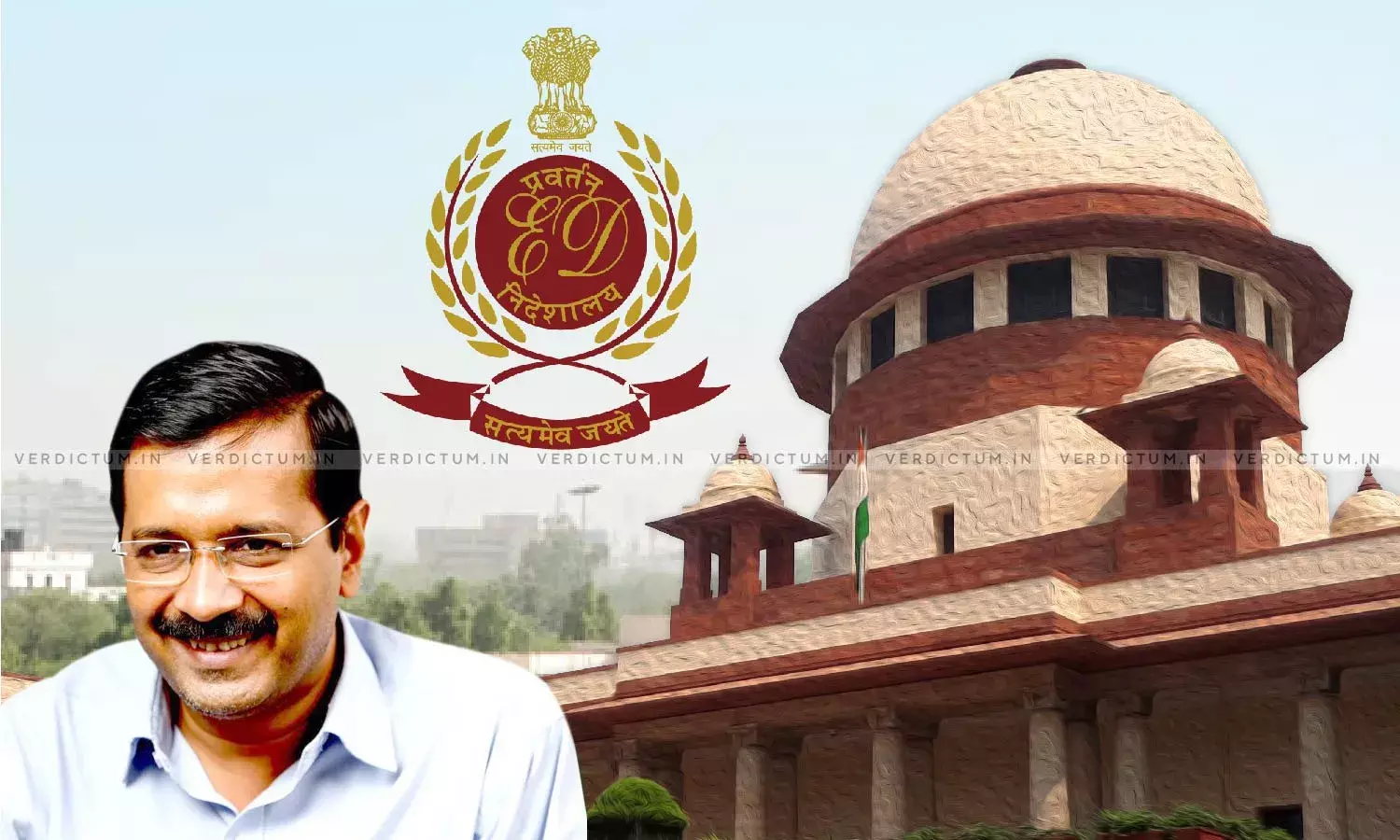"Re-Arrested By CBI While Arrested Under PMLA": Arvind Kejriwal Withdraws SLP Before Apex Court With Liberty To File Fresh Petition
Arvind Kejriwal withdrew his Special Leave Petition (SLP) filed before the Supreme Court in the money laundering case related to the Delhi Excise Policy case. In the SLP, he was challenging the June 21 order of the Delhi High Court, whereby the Court had stayed the Trial Court's order granting bail to him.
Notably, yesterday (June 25), the Delhi High Court, in a final order stayed the Trial Court's order granting bail to Kejriwal in the PMLA case. Additionally, Kejriwal was arrested by the CBI on June 25 and was produced before Rouse Avenue Court today morning. The Special Judge allowed the formal arrest of Kejriwal.
At the outset, Senior Advocate Abhishek Manu Singhvi, appearing for Kejriwal, informed the Vacation Bench of Justice Manoj Misra and Justice SVN Bhatti that he had been re-arrested by the Central Bureau of Investigation while already arrested under the Prevention of Money Laundering Act (PMLA).
"Be that as it may, my Lords, I think there will be no option for me but to challenge the substantive properly in a properly constituted SLP with all these new grounds, etc. So, I am seeking your Lordships' liberty to withdraw, but with express liberty that I will be challenging both the June 21st Order, which I am already before your Lordship for, and now more importantly, the June 25th," Singhvi submitted.
The Senior Counsel also submitted, "This is happening at such a fast pace."
During the hearing, Senior Advocate Vikram Chaudhary also appeared for Kejriwal. Solicitor General Tushar Mehta and Additional Solicitor General (ASG) SV Raju appeared for the Union of India and ED, respectively.
Taking note of the submissions and the recent development in the case, the Bench noted that the final order on the stay application have been passed by the Delhi High Court.
The Court ordered, "Dr. Abhishek Manu Singhvi prays to withdraw this Special Leave Petition (SLP), so as to file a fresh petition repeating the same prayers and also adding the prayer to challenge the Order dated 25.06.2024. Shri SV Raju, who appears for the Enforcement Directorate (ED), has no objection if the petition is allowed to be withdrawn in the aforesaid terms. In view of the above, the SLP is dismissed as withdrawn with liberty."
Accordingly, the SLP has been dismissed as withdrawn.
On Monday (June 24), the Union of India and the Enforcement Directorate, during the hearing of the appeal by Kejriwal raised questions about the legality of the order of the Trial Court and highlighted that the Trial Court had specifically stated in the order that it did not go through the record of the case.
The High Court had reserved the verdict in the Enforcement Directorate's plea challenging the bail granted to Arvind Kejriwal, after it had allowed the urgent listing of the petition. The Court had stated that the stay on Trial Court order would continue till the pronouncement of the verdict.
On June 20, 2024, Special Judge, Rouse Avenue Court, granted bail to Kejriwal. While granting bail, the ED had requested to keep the bail order in abeyance for 48 hours to allow the central agency to avail of legal remedies like moving the High Court in Appeal. However, the same was refused by the Trial Court.
Pertinently, on May 10, the Apex Court had granted Interim Bail to the Delhi Chief Minister till June 1. On May 7, the Bench had clarified that, if it releases Kejriwal on bail, it does not want him to perform official duties.
Prior to that, the Apex Court had observed that it may consider granting interim bail to Kejriwal on account of elections. On April 29, the Bench had asked the Senior Counsel appearing for the Delhi CM, "Why have you not filed any Application For bail?"
Previously, the Enforcement Directorate had filed an extensive affidavit-in-reply to the Special Leave Petition by the Delhi Chief Minister, Arvind Kejriwal, assailing the order passed by the Delhi High Court upholding the arrest and remand in the money laundering case. In its reply, the ED had alleged that Arvind Kejriwal is the kingpin and key conspirator in the Delhi Liquor Policy Excise Scam, responsible for the mass destruction of evidence, and the main facilitator of the new policy for the bribe givers.
The ED had earlier, stated in its affidavit that there are reasons to believe, based on material in possession, that Kejriwal is guilty of the offence of money laundering. The ED had also made a comparative table to demonstrate the changes made that were allegedly arbitrary and irrational, made only to ensure large-scale profits to the bribe givers. It was also stated by the ED that Arvind Kejriwal was asked to provide the password to his mobile phones again and again, but he refused to share the same and even his statements during custody would reveal that despite being confronted with materials, the petitioner chose to give completely evasive answers.
Cause Title: Directorate of Enforcement v. Arvind Kejriwal [Diary No.: 27685 of 2024]




